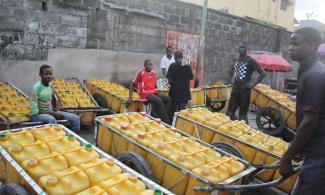
"They do not supply us water. We pay them to fix pipes, but they do not provide enough pressure for the water to run up, so we still resort to paying extra fees to Meruwa to bring up water. Even the water from the Meruwa is not something I can drink. I still end up buying bags of sachet water. This is not fair because they bill us every month."
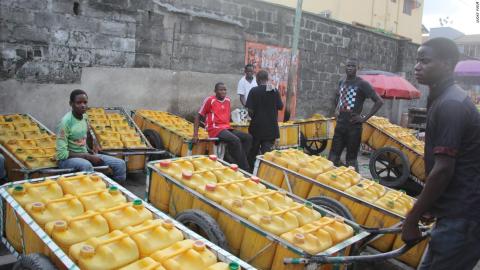
World Water Day is an annual event set aside to highlight the importance of freshwater and advocate for the sustainable management of freshwater resources. World Water Day is celebrated around the world with a variety of events.
According to a 2015 WHO/UNICEF report, 2.1 billion people globally lack safe water at home. Of those people, 263 million spend more than 30 minutes per round trip collecting water; 844 million do not have drinking water services, while 159 million drink water directly from surface sources such as streams or lakes.
World Water Day in Lagos
March 22 is World Water Day and it drizzled in Lagos; wet roads and roofs. Lagos is surrounded by lagoons, fresh and brackish water bodies everywhere that you would expect potable water to be plentiful for Lagosians. Instead, there is a water crisis in Lagos and it is not getting any better.
Troubling statistics from the United Nations (UN) show that only 10% of the 21 million residents of Lagos have access to water supplied by the Lagos State Water Corporation. To highlight the scale of the water crisis at the national level, WaterAid reported that about 73,000 Nigerians died from lack of access to running water in 2014, compared to 4,000 lives claimed by the terror campaign of Boko Haram.
Lagos is one of the states in Nigeria with the financial capacity or potential and abundant water resources to guarantee equitable potable water services for its citizens. However, the ‘mega city’ of Lagos, even after all these years spent by previous administrations and four years of the Governor Akinwumi Ambode administration, no government seems to have found it needful to pipe water to citizens still struggling to find water suitable for drinking and sanitation.
Ambode couldn't solve the problem and in fact, late 2017, resorted to making a law to privatise water in Lagos, a move which was rejected by environmental activists in the state.
Meruwa Malam -The Men Gradually Replacing Water Corporation in Lagos
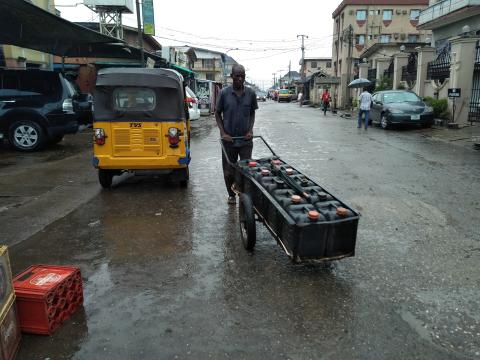
For Uthman, a cart pusher selling water on the streets of Surulere in Lagos, the inability of the Lagos Water Corporation to supply water to residents in the area is an opportunity for him "to survive without having to beg”.
Speaking with SaharaReporters, Uthman said: "This is how I make money to survive without having to beg. I push a cart loaded with water gallons to different households and sell to them for N30 per gallon. It is a very stressful job and sometimes you risk getting hit by a car, but what choice do I have; I need to feed myself.”
Aamil, another water vendor, whom SaharaReporters met while he was delivering water to a customer in Lagos, said even when it rains, he still makes money, depending on the demand.
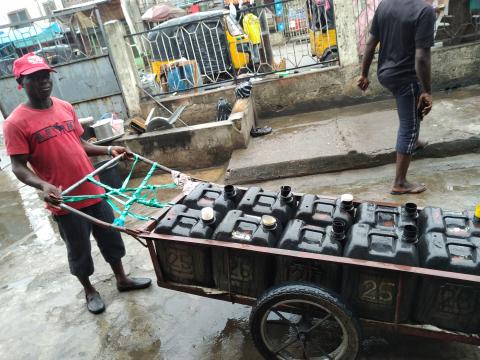
"Sometimes, I make N1,500; sometimes N1,000 and even N500 at times, but it's the only thing I do," he said.
When asked about the activities of the Lagos Water Corporation, Aamil said: "To be honest, I'm not sure if I want them to be active again, but if I'm going to be selfless, I'll say they should do more to provide water for the people."
A resident of Shomolu in Lagos told SaharaReporters that water supply to some neighbourhoods in the state has been cut off for a while now.
"They do not supply us water. We pay them to fix pipes, but they do not provide enough pressure for the water to run up, so we still resort to paying extra fees to Meruwa to bring up water. Even the water from the Meruwa is not something I can drink. I still end up buying bags of sachet water. This is not fair because they bill us every month," he lamented.
A resident of Ikorodu told our correspondent that the Lagos State Water Corporation is yet to extend its services to that part of the state, adding that most of the house owners had to dig boreholes to get water running.
"We've not seen the water corporation around here. Most of the landlords around here dig their own boreholes as it's the only way to have water provided for your tenants," he said.
When asked about the challenges faced by households with boreholes, he said: "The major challenge we face with boreholes is electricity. If there's no light, we have to buy fuel to pump water and it's not everyone that can afford to get fuel all the time. Some people around here have wells, so we'll be glad if this water corporation people can extend their services to this area."
Groups Ask Sanwo-Olu To Stop Ongoing Water Privatization Plans
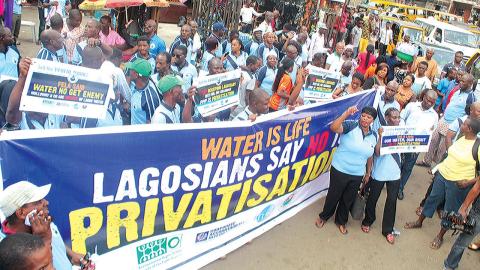
The Our Water, Our Right Movement led by the Environmental Rights Action/Friends of the Earth Nigeria (ERA/FoEN) has cautioned Babajide Sanwolu, the Lagos Governor-elect, against continuing on the path of previous administrations in the state on plans to privatise water in Lagos.
In a statement issued to mark the 2019 World Water Day, the movement said even though Lagos is surrounded by water, most of its citizens still lack adequate and safe drinking water and sanitation, which predisposes them to illnesses such as dysentery and cholera, with grave implications on productivity.
They, however, frowned at the fact that in tackling the water challenge, previous administrations including that of outgoing Governor Akinwunmi Ambode have not consulted Lagos citizens, and instead, advanced false solutions including the globally-discredited Public Private Partnership (PPP) model of water privatisation.
The letter, signed by Nnimmo Bassey, Chair of the Board of ERA/FoEN, read: “Lagos residents are victims of a system that has failed them for years due to lack of political will and lack of sustained budgetary allocation to the water sector. Lagos does not need to experience social conflicts, drown in debt, or hand our right to privatisers to tackle the water crisis.
“Evidence abounds that countries that have experimented the PPP and other models of water privatization have learnt bitter lessons and opted out by re-municipalizing – another word for taking back privatized public services and putting it where it should be – under public control. Remunicipalisation of public water has spread across the world from Buenos Aires to Berlin, Ghana, Gabon, Jakarta, Mozambique, Paris, Tanzania, and lately nearby Cameroon.”
They warned that the PPP is “anti-people” because it is difficult for cities to exit, despite rate hikes, service cut-offs, and unfulfilled infrastructure promises.
They condemned the outgoing administration of Ambode, who has been reported to have begun concession talks with Veolia, Metito and Abengoa, which are allegedly “transnational corporations with track-record of corruption and human rights abuses”, adding that they had protested this move to the current state House of Assembly and compiled findings on the multinationals in a document entitled: ‘Veolia, Metito, Abengoa Cannot Be Trusted with Lagos Water’, which has been made available to the state government for it to backtrack.
In its recommendations to Sanwo-Olu, who will assume office on May 2019, ERA/FoEN demanded a halt to concession talks or agreements entered into with transnational corporations like Veolia, Metito, and Abengoa.
They also recommended the “need to fully uphold the human right to water as an obligation of the government representing the people; integration of broad public participation including that of women in developing plans to achieve universal access to clean water, and a review of the recent Lagos Environment Law and removal of all the remaining provisions that open the doors for PPP and other privatization forms.”
Others are: “rejection of all contracts designed by or involving the IFC, which operates to maximize private profit; building the political will to prioritize water for the people by investing in the water infrastructure necessary to provide universal water access, which will create jobs, improve public health, and invigorate the Lagos economy; increasing budgetary allocation to the water sector; and institution of a Water Trust Fund that will expand public financing of the water sector.”